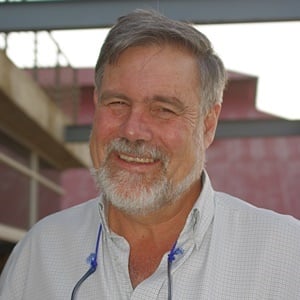
South Africa will be able to take some of the credit if the world takes effective steps to limit climate change at the 2015 United Nations Climate Conference (COP21) in Paris from 30 November to 11 December.
So said Professor Bob Scholes, Global Change and Sustainability Research Institute, University of the Witwatersrand, said during a talk at Sci-Bono Discovery Centre in Newtown, Johannesburg, on 29 October.
Read: South Africans may have solved solar power problem
“About ten years ago the climate change negotiations got into a logjam,’ he explained. “The developing world was saying to the developed world, well, you guys caused it, you sort it out.” The developed world’s response was that it could not be done by them alone, and “No-one would blink,” said Scholes.
“It was South Africa that broke that logjam by going to the Bali negotiations and saying that, according to the [United Nations Framework Convention on Climate Change], we have no obligations for emissions reduction; but we are voluntarily going to put on the table what at that stage was a stunning amount of 30% - and that changed the whole negotiations.”
South Africa has very good reason to promote action against climate change. We are an especially climate-vulnerable country, as Scholes pointed out: thanks to a climate anomaly, we get both drier and hotter as the global average temperature rises (for the rest of the world, the experience is hotter and moister).
Read: Climate change will upset ocean chemical cycles
Our temperature is also rising at twice the global rate, a figure which has been known for some time but recently received support from research done by one of Scholes’ students. The student pulled historical weather records from Volksrust in Mpumalanga for a 110-year period, from 1904 to 2014. The upward trend at twice the global rate is quite clear.
And that spells bad news for South Africa’s food sustainability. Research (Blignault et al 2009) has shown that, while a reduction in rainfall is bad for crops, an increase in temperature is even worse. And the same goes for livestock: like all mammals, cattle, sheep, goats and other domesticated animals need to keep their body temperature stable at 37 ° Celsius. Scholes describes how dairy herds, for example, can’t produce milk beyond a certain level – in Egypt, dairy operations keep their cattle indoors and air-conditioned for that reason, a very expensive and unsustainable way of farming.
Read: Global warming may cause trees to 'migrate'
Even humans cannot keep going productively in the kind of heat that would hit us – bearing in mind that if the world experiences a 3° rise, we’ll have 6°, taking us from a pleasant 30° summer day to sweltering in 36°. Just days before Scholes spoke, “Earth's hottest temperature ever recorded in the month of October occurred on Tuesday, October 27, 2015 in South Africa, when Vredendal hit a remarkable 48.4°C,” wrote weather blogger Dr Jeff Masters.
The continuous litany of record temperatures (2014 was the hottest year on record, 2013 tied for fourth-warmest, 2012 was the second most extreme and one of the ten hottest, and so it goes on, with 2015 already predicted to beat 2014 and take the new record with an global increase in average temperature ten times than expected). Given the science that has accrued around this issue, with which historical records such as those disinterred in Volksrus agree, if anyone still persists in querying the fact that climate change is happening, said Scholes, “I don’t know what they’re smoking.”
Looking forward to Paris, said Scholes, “I know it sounds like scaremongering to say this is ‘last-chance saloon’, but it really has got to that point.” He went on to say, “…we’re already committed essentially to a 3 degree Celsius rise; there’s no chance we’ll stay below 2 degrees; this super tanker is not going to turn. And if we delay for another ten years then you overshoot to 4 degrees, and once you get into that territory, then the technical options for adaptation are very slim; then you start talking about a whole new world, a deeply unstable world, one where we probably can’t all feed ourselves, so we want to stay away from that.”
But Scholes is reasonably confident that there’s a change in the wind, with major figures like the President of the USA and the Pope expressing an understanding of the cliff we’re poised above, and there’s a new determination among major parties to the negotiations.
Read: Calculating climate change and coevolution
“The reason I think in December we’ll go forward is that both the main arch-rivals have made big commitments: the United States, despite all the rhetoric, has committed to a massive reduction and so has China.” These two countries together represent 60% of global emissions.
South Africa’s role has been pivotal, said Scholes, because we have an understanding of all sides of the discussion. This is because we really are a ‘world in one country’: we’re a major fossil-fuel user ourselves; we’re a developing country with massive needs to grow the economy, but with emissions already at a level similar to those of Sweden; we have a special vulnerability to climate change, but our economy is in part built on being a fossil fuel exporter. But the good news is “We have one of the best class solar resources in the world so we don’t have to necessarily build our energy future on coal.”
Although it has taken much too long to seriously address climate change, “I think it will come now. And a lot of that has been due to the role of South Africa working the back corridors.”
Also read:
Biggest climate change since dinosaurs
Global warming to have devastating effect on supply and quality of Arabica coffee




 Publications
Publications
 Partners
Partners














